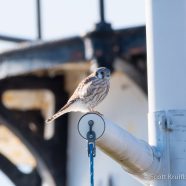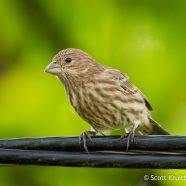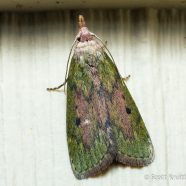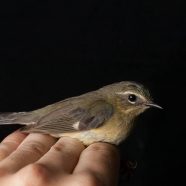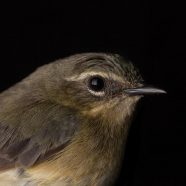Female American Kestrel
This has been one great late fall stretch for raptors for me. Not coincidentally, it has also been a poor stretch for passerines during my survey work, with very little of note apart from common and expected species in low numbers. Snowy Owls, Northern Harriers, Merlins, Peregrine Falcons, Red-tailed, Sharp-shinned, and Cooper’s Hawks have all been providing some great looks or photos. The unfortunately uncommon American Kestrel has even cooperated with this female being seen semi-regularly at Stratford Point. Her she is perched on the flagpole at the lighthouse before zipping off. I...
Read MoreFemale House Finch
This female House Finch (Haemorhous mexicanus) is already a feeder friend – have you filled your bird feeding stations yet this fall?
Read MoreThe Bee Moth
This pretty moth gave me a tough time trying to pin down an identification, but it looks to be a female Aphomia sociella – The Bee Moth. I was less enthusiastic in learning that Aphomia sociella is a non-native and often pest moth that was likely introduced from Europe via the colonists and bee hives. They often end up destroying those hives from the inside out. Everything has its place, I suppose… Scott Kruitbosch Conservation & Outreach Coordinator
Read MorePine Swamp Warbler
To answer yesterday’s quiz by RTPI Affiliate Sean Graesser, the Pine Swamp Warbler (Sylvia pusilla) was a bird Audubon originally painted as a new species of warbler. However, you may have figured out that it was the female Black-throated Blue Warbler (Setophaga caerulescens). This was an interesting mistake that highlighted the dimorphism between the male and female. It is one of the most drastic sexually dimorphic species of North American warblers.
Read MoreWarbler Quiz
Here’s some work for you via RTPI Affiliate Sean Graesser…while setting across North America to write his The Birds of America, John James Audubon discovered 25 species of birds unknown to science at the time. One such discovery was this nondescript warbler that he deemed a different species, and it would become plate 148 in his book. However, it wouldn’t remain a species for long. This bird is in fact a female of one of our more showy North American warblers. What is it? And what did Audubon originally call it?
Read More



